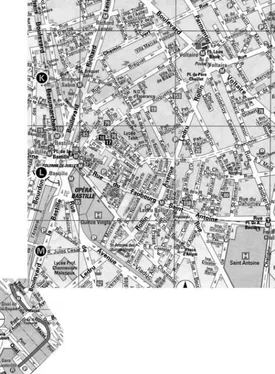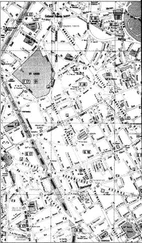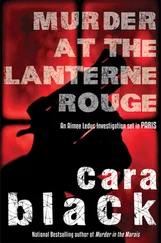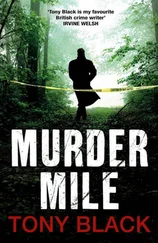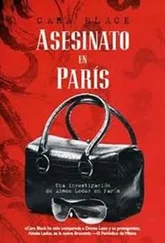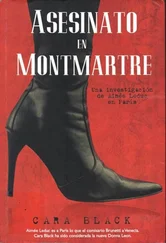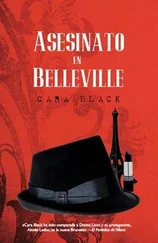Beautiful striations of wood grain. Veined white and grey marble. The interior with its seven paperboards in red morocco leather bore the estampillé of WEISWEILLER. A piece from the period of Louis XVI.
He got to his knees, touching the wood with his fingertips like a young boy’s hesitant first caress. Even if blinded, he’d know the velvety texture of the rare wood, the unique curve and supple delineation, the trademark of Weisweiler. Weis-weiler had worked for Jean-Henri Riesener, furniture- and cabinetmaker to the French monarchs.
Mathieu’s heart jumped. The only other eighteenth-century Weisweiler commode sold after World War II had fetched close to 70 million French francs,* co-bought by a millionaire and the French State, to be returned to Versailles where it had stood in the library before the French Revolution.
The next piece, stamped DELAITRE, was from 1738, époque Louis XV. It was a chest with two rows of drawers, in purple wood veneers with handles gilded in faille and bronze decorative hardware.
Would the Comte reveal their history to him?
“And the provenance . . . ?” Mathieu asked.
“Sell them anonymously. Don’t worry, do a little work on them and they’ll sell.”
But Mathieu had seen the telltale red G. The characteristic mark of the Gruenthal collections. And he understood.
He might as well put the soles of his feet into the flames. Handling these would be the equivalent of waltzing with fire. All the items must be pieces the Gruenthal family had acquired from the Nazis—pieces that by rights should have been handed over to the French government for return to the original owners or their heirs. A long time ago.
And the Comte, where had he gotten these pieces . . . was he working for himself or them . . . or both? What could have reduced him to this?
The Orangerie’s even climate was a perfect storeroom. He wondered how long they’d been here. And he knew he’d risk everything if he helped the Comte. But he’d be a fool if he didn’t.
The Comte, he figured, couldn’t risk using a compagnard de travail— a prestigious master craftsman apprenticed in the seven-year program that dated back to the Middle Ages. A compagnard wouldn’t touch unprovenanced pieces. Not even with a barge pole.
Envy . . . yes, Mathieu felt a soupçon of envy for the compagnards. But after years of working with his father, even though he stayed a faubourg artisan, he knew his craft rivaled that of a compagnard .
The Comte would know that someone like Mathieu, an ébéniste from the Bastille quartier , would remain discreet, too glad of the work to raise questions. And the Comte had trusted his father, knew the Cavour tradition.
So he had to play this right. Not appear anxious. The Comte needed him. And Mathieu needed the francs to buy his building in order to save it.
“Me, I repair. There’s a lot of this work,” he shrugged. “You expect me to sell it, too?“
“You know people who can,” the Comte said. “And even you can see it’s Louis XVI . . . worth, well, a lot.”
“What’s in it for me?” he said.
“Your father wasn’t this difficult,” the Comte said. “Or didn’t you know?”
Mathieu hadn’t.
“Listen,” the Comte said, understanding in his eyes. “Once, sometime ago, your father helped me. He benefited. It’s not complicated.”
Mathieu remembered the Comte visiting the shop, his servant in tow, and how they’d gone out for Bertillon crème glacée , the best ice cream in Paris. His father had bought the truck afterward. A Renault, top of the line. Still in perfect shape.
“Don’t think I won’t be generous. Back the truck up, take whatever fits inside,” the Comte said, as if referring to sides of beef. “I count on you.”
Mathieu noticed the once-manicured, now overgrown, lime trees in planters lining the vaulted walls as he carefully wrapped and dollied several pieces of furniture to the truck. When he drove out, the Comte waved to him as if they were friends.
In the rearview mirror, the Comte, standing in the graveled court, looked solitary and sad, as if diminished by the furniture’s departure. How pathetic even very rich people could look, Mathieu thought. Even a count with a château, who had only a magnificent collection of priceless antique furniture left.
Mathieu would need help to sell the pieces. And he knew where to go.
The thudding sound of a flic pounding on the glass-paned courtyard door brought him back to the present. He dropped the flat-edged scraper, swore, and took a step back.
Get a grip. Don’t lose control, he told himself.
“Forgive me, officers,” he said, opening the door of his workshop. “The older I get, the louder I play the radio.”
Keep calm. They’d ask questions, nose around and they’d be gone. He gestured for the three men to come inside. One, wearing a jacket too big for him, with patches on the elbows, flashed his ID.
“Sorry for the trouble, monsieur,” he said with a small smile, one hand in his pocket. He shrugged, as if to intimate these intrusions inflicted on citizens were simply a part of life. His socks were mismatched, one brown, the other gray.
Mathieu saw the flics surveying the cans of putty, the varnish bottles on his shelves, and the chairs hanging from the ceiling, drying.
“Any trouble, officers?” Mathieu asked, wiping his hands on his apron.
“We’re investigating a homicide,” he was told.
Mathieu’s emotions were in turmoil. An irrational urge to babble about the past and point them downstairs welled up in him. To rid himself of his guilt, to get it over with.
Instead he reached for the turpentine-soaked rag and wiped his work table.
“Cut yourself badly?” asked the one in the ill-fitting jacket. He was older, with bags under his eyes and a bland expression. He pointed to Mathieu’s bandaged finger.
“A hazard of the trade,” Mathieu said. “Happens more the older I get.”
“We have a search warrant, Monsieur Cavour,” he said, his tone matter-of-fact. “So if you don’t mind . . .”
“A search warrant?” Mathieu stiffened in fear. He tried to breathe. The impulse to confess evaporated. Had they found out about the furniture? “What do you mean?”
The flics pulled latex gloves from their pockets, slipped their fingers inside.
“Let’s begin with your tools.” It was as if Mathieu hadn’t spoken. “The set of chisels. Like those.” He pointed to the ones on the shelf.
Before Mathieu could summon the will to move his legs, one of the flics pushed over a stool, climbed up, and began taking his tools down.
What about my rights, Mathieu wanted to shout. My rights!
The past flowed over him. His helplessness. The unfairness. Those hired thugs had beat him up, tried to kick him out of his atelier, until he persuaded them he had money. And would keep giving them money if they just let him stay.
“Monsieur . . . monsieur?” the one with the bags under his eyes was saying, tugging his elbow. “ Ça va . . . you’re white-faced. Not going to pass out, are you?”
Mathieu shook his head.
“What are you afraid of, monsieur?” he said. “We’re just doing our job. See, we have a warrant, but we prefer to have your cooperation.”
“Cooperation?” Mathieu rubbed his forehead.
“A woman was killed in the next passage. We have to check everything.” The man nodded. “I understand that it upsets you.”
And from the look in his sad droopy eyes, Mathieu thought the flic did.
One of the flics raised his eyebrows. “Can you tell me where your chisel is, monsieur?”
Читать дальше
